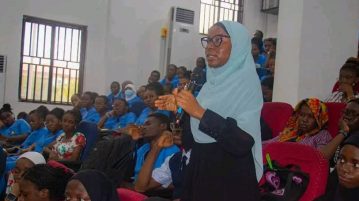Residency training is an important part of the medical career pathway…
Still on the trail of speaking with resident doctors in Nigeria, towards providing insights into the current state of residency for other colleagues and dispelling misconceptions surrounding this pathway, we interviewed a paediatric resident based in the Federal Capital Territory, Abuja.
Interviewer: Mary O. A. Awoniyi
MM: Can you briefly introduce yourself?
I am Minka Ndifon, a Paediatric resident at the Federal Medical Centre (FMC), Abuja. I started my residency training in 2022, and I am currently a Senior Registrar in my department.
MM: What motivated you to pursue a residency program in Nigeria, and how did you come to choose the specialty and faculty you are training in?
I decided to pursue residency because I believe it would give me depth and a good foundation for a career in health policy and management. I chose Paediatrics because children are a vulnerable group that can be easily overlooked. Furthermore, my best experiences as a medical student and house officer were in Paediatrics.
MM: Interesting. Since commencing your specialty training, what has been the highlights and most rewarding part of your experience so far?
One of the highlights was participating in a cardiac mission where open heart surgeries were conducted for some of our patients. It was turbulent, stressful, and rewarding. The most rewarding part is caring for early preterm newborns and seeing them hit their milestones later in infancy and beyond.
MM: There are so many hear-says about residency in Nigeria today. What are some common misconceptions that you’ve encountered, and how do you wish people could better understand the experience?
“Residency is useless” – while I understand that we lack significant infrastructure, I believe that residency is what you make of it. There are opportunities for growth and innovation beyond your specialty. Focusing on what’s lacking robs you of ability to see opportunities.
MM: What are some of the current challenges encountered during residency training, and how do you think these can be managed by residents?
Lack of local research and hands-on skills with medical equipment. Research should be encouraged among junior residents (with incentives like Continuing Medical Education (CME) points or something else of significance). For lack of skill – residents can attach themselves to a facility (public or private) where skills can be learned. This may require support from their own department, hospital or even associations.
MM: How do you balance the demands of residency training with personal life? What coping mechanisms do you use and what self-care practices do you prioritize?
BOUNDARIES!!! Be fully present at work and don’t take work home. Be fully present at home, schedule rest and refresh. For self-care, I play sports, hike, play music, participate in karaoke and sleep. Laughs.
MM: How do you see the future of specialty training in Nigeria evolving, and in what way can young doctors be well positioned for it?
There’s a demand for Nigerian specialists. With the rising cost of healthcare in high income countries, we beginning to see medical tourism in favour of Nigeria – Nigerians in diaspora are coming back home for certain healthcare services. There’s also the integration of tech in healthcare. And to position ourselves, we must look out for trends and develop skills that will be required in the future.
Always ask, “what can I do that a machine or algorithm can’t?”… It’s important to stay ahead of the pack and develop skills that will be useful on the global scale.
MM: What advice would you give to junior residents who are just starting out in their programs?
Have a plan. Set goals. Be part of a community (clinical and non-clinical), that’s how you get opportunities, as well as expand your perspective.
MM: What message would you like to convey to potential applicants who may be hesitant or unsure about pursuing a residency program?
Think of the big picture and determine if and/or how residency fits into your long-term career goals.
MM: On a scale of 1-10, rate your own residency experience?
6.5/10.
MM: If you could go back in time, would you still make the same decision in terms of specialty choice and training centre?
Yes. Same decision, same specialty. But maybe a different training centre.
MM: Out of curiosity, what different centre would you have looked at or advice for training?
Federal Medical Center Ebute Metta. Simply because they place a high emphasis on quality improvement processes, which is a skill and an area many other centres lack.
MM: Thank you for your time. We hope this would provide the needed insights for other doctor colleagues.




